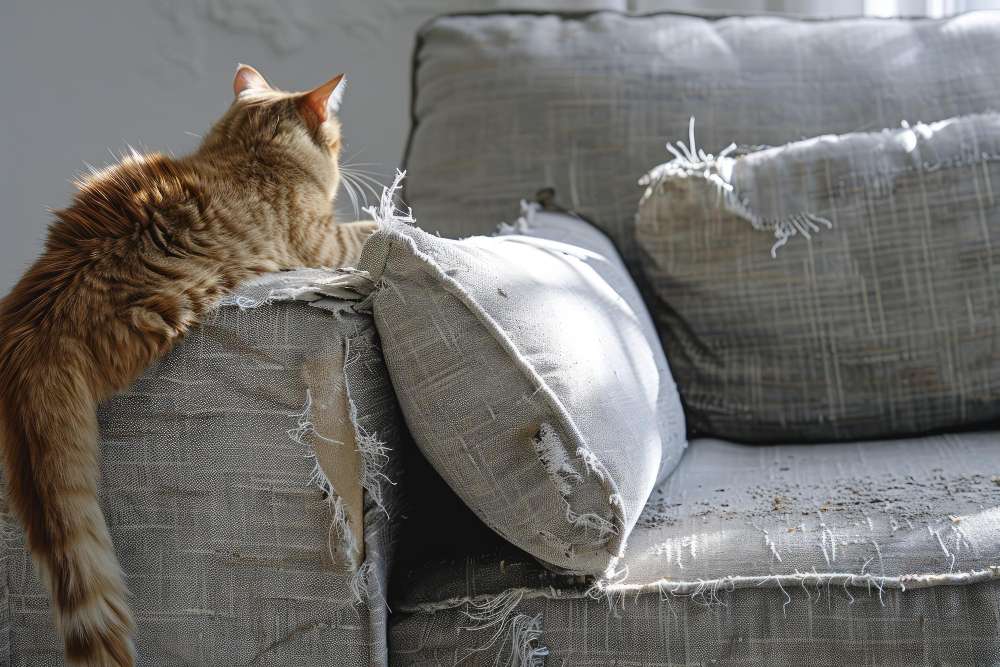Your cart is currently empty!

The Ultimate Guide to Finding Your Lost Cat
Hope and Immediate Action
The sinking feeling when you realize your beloved feline is gone is something no Atlanta pet owner wants to experience. If you’re currently searching for your lost cat in Atlanta, or surrounding area you’re likely feeling a mix of panic, worry, and a deep sense of helplessness. We understand the emotional turmoil and want to offer you more than just sympathy – we’re here to provide a practical, step-by-step guide designed to maximize your chances of a joyful reunion.
When you’re asking yourself, “what to do when I lose my cat in Atlanta?” or “how to find my lost cat near me in Atlanta?” this guide will be your go-to resource. Finding a lost cat in a bustling city like Atlanta can seem daunting, but with the right approach and resources, you can significantly increase the odds of bringing your furry friend back home.
This guide will cover:
* Crucial initial steps to take in the first 48 hours, emphasizing immediate action and thorough searching.
* Leveraging online resources, including social media platforms, lost pet databases, and online mapping tools.
* Essential offline strategies, such as physical search techniques, contacting local organizations, and community engagement.
* Preventative measures to keep your cat safe, including microchipping, indoor environments, and home cat proofing.
* Expert advice on handling skittish cats and emotional support resources.
* Heartwarming success stories of reunited cats in Atlanta and the power of community support.
This guide aims to be your comprehensive tool in this stressful situation, and we believe that persistence and hope are your strongest allies.
The Critical First 48 Hours: Immediate Search and Action
When your cat goes missing, the first 48 hours are undeniably the most crucial. Swift and decisive action can dramatically increase the likelihood of a successful reunion. Cats, especially when disoriented or frightened, often don’t stray far initially, making immediate, thorough searches of your home and surrounding area paramount. During this time, it is important to be proactive with online and offline strategies. This section will guide you through the essential steps to take within this critical timeframe, ensuring you cover all bases in your search.
Immediate Physical Search: Start Looking for Your Lost Cat In and Around Your Home
* Time is of the essence. Begin by conducting a meticulous search of your home. Focus on common hiding spots: under beds, inside closets, behind large furniture, and even inside appliances. Cats, particularly indoor cats, may become overwhelmed and seek refuge in familiar, confined spaces. Use a flashlight to check dark corners and areas that are hard to see.
* Expand your search radius gradually. Start with your immediate yard and then extend outward, checking under porches, sheds, decks, and in dense bushes. Cats can become trapped or hide in these areas.
* Search during dawn and dusk. Cats are crepuscular, meaning they are most active during these times. They are more likely to respond to your calls or come out of hiding when the environment is quieter.
* Utilize familiar scents. Place your cat’s litter box, bedding, or favorite toys outside. The scent can act as a beacon, guiding them back home. If you have any worn clothing, leave it outside as well.
* Call your cat’s name frequently, and listen carefully for any response. If your cat is used to a specific sound, such as a treat bag shaking, use that sound as well.
Creating and Distributing Effective Flyers:
Craft clear, legible flyers with a recent, high-quality photo of your cat. The photo should show your cat’s unique markings and features. Include your contact information (phone number and email) and a brief description of your cat’s breed, color, and any distinguishing characteristics.
To create a lost cat flyer quickly, you can use online tools that generate them for you. These tools make it easy to create a professional-looking flyer fast, which is crucial when you are trying to find your lost cat in Atlanta. Here are a few resources that can help you with creating a flyer fast:
* 24Petwatch Lost Pet Poster Generator:
When you are trying to find a lost cat in Atlanta, printing flyers quickly is very important. Home printing is the fastest method, but if you don’t have a printer, here is a list of places where you can print your lost cat flyers:
* Local Library: Many local libraries offer affordable printing services, often with quick turnaround times. Check your library’s website or call for specific printing options and costs.
* The UPS Store provides professional printing services, including flyer printing, with options for various paper types and finishes. They can also laminate your flyers for added durability.
* Walgreens offers convenient, same-day photo and document printing services. You can upload your flyer online or print directly from a USB drive at their in-store kiosks.
* Office Depot provides a range of printing services, including flyer printing, with options for color and black-and-white prints, as well as lamination. They often have online ordering and in-store pickup.
* Staples offers professional printing services with options for various paper types and sizes. They also provide lamination services to protect your flyers from the elements.
Post flyers at strategic locations. Distribute them to local businesses (grocery stores, coffee shops), vet clinics, animal shelters, community centers, and libraries. Ask if you can post them on community bulletin boards.
* Consider offering a reward. This can incentivize people to keep an eye out for your cat.
* Make sure to laminate the flyers, or put them in plastic sleeves, in case it rains.
Online Resources: Expanding Your Search Digitally
The digital age offers a wealth of resources to aid in your search for a lost cat. Utilizing these online tools can significantly expand your reach and increase the chances of finding your furry friend.
Social Media Platforms:
* Nextdoor: Leverage the power of Nextdoor, a community-based platform, to reach your immediate neighbors. Post a detailed description of your cat, including a clear photo, and ask neighbors to keep an eye out. Use relevant hashtags like #LostCatAtlanta, #LostPetAtlanta, and your neighborhood’s hashtag (e.g., #MidtownAtlanta) to increase visibility.
* Facebook Groups: Join Atlanta-specific lost pet groups, such as “Lost Pets of Atlanta,” to connect with other pet owners in the area. Share your cat’s information and photo, and actively participate in the group to stay updated on any sightings.
* Instagram: Utilize the power of visuals on Instagram by posting photos and descriptions of your cat. Use relevant hashtags and location tags to reach a wider audience.
Lost Pet Databases:
* PawBoost: Create a free profile for your lost cat on PawBoost, a comprehensive lost pet database. PawBoost uses facial recognition technology to help identify lost pets and connects you with potential sightings.
* Craigslist (Pets): Monitor the “Pets” section of Craigslist for potential sightings of your cat. Be sure to post your own listing with a clear photo and detailed description.
* Petco Love Lost: Utilize Petco Love Lost’s online resources, including their lost pet database and facial recognition technology, to expand your search.
* PetFinder: A popular website for finding lost and found pets. Create a listing for your cat and search for potential matches.
Online Mapping and Tracking:
Use Google Maps to create a virtual search grid: Mark your home as the center point and draw circles of increasing radius to represent your search areas. This will help you organize your search efforts and ensure you cover all potential locations.
Pin your search locations: Drop pins on Google Maps to mark specific locations where you’ve searched or received potential sightings. This will help you track your progress and identify areas that need further attention.
Additional Online Resources:
* Facebook Marketplace: Post a “Lost Pet” ad on Facebook Marketplace to reach a wider audience.
* Local news outlets: Contact your local news stations and newspapers to see if they can help spread the word about your missing cat.
* In addition to online databases, connecting with local shelters is crucial. For a comprehensive list of Atlanta’s cat shelters and additional resources, be sure to check out our detailed guide on Atlanta Cat Shelters and Resources
Offline Search Strategies: Reaching Your Community
While online tools expand your search’s reach, don’t underestimate the power of traditional, in-person methods. Engaging your local community and conducting thorough physical searches can be crucial in finding your lost cat in Atlanta. These strategies directly interact with your neighbors and leverage the familiarity people have with their surroundings.
Physical Search Techniques:
* Thoroughly Search at Night with a Flashlight: Cats’ eyes reflect light, making them easier to spot in the dark. Use a powerful flashlight to scan under bushes, porches, and other hiding spots. Pay close attention to any reflective eye shine. When trying to find a lost cat in Atlanta, this method can be very effective as the city is very populated.
* Leave Out Food and Water: Place your cat’s favorite food and fresh water outside your home. The familiar scent and the promise of sustenance can lure them back. Use strong-smelling food, like tuna or wet cat food, to maximize the effect.
* Consider Using a Humane Trap: If your cat is skittish or has been gone for an extended period, a humane trap might be necessary. Bait the trap with food and monitor it closely. You can rent or purchase humane traps from local animal shelters or hardware stores. When using a trap, make sure to check it very often.
* Search Under and Inside of Structures: Cats will often hide under decks, sheds, and inside of vehicles. Be sure to carefully search these areas.
Contacting Local Organizations:
* Contact Local Vet Clinics and Animal Hospitals: Call vet clinics and animal hospitals in your area to report your lost cat. They may have had someone bring in a found cat matching your description. When looking for a lost cat in Atlanta, this is very important because someone may have taken your cat to the vet.
* Contact Animal Control and Police Departments: Inform these agencies about your lost cat. They may have picked up a stray matching your cat’s description.
* Inform Mail Carriers and Delivery Drivers: These individuals are familiar with the area and may have spotted your cat during their routes. Provide them with a flyer and ask them to keep an eye out.
Community Outreach:
* Canvass Neighborhoods and Talk to Residents: Go door-to-door, talking to your neighbors and showing them a flyer of your cat. Ask them to check their yards, garages, and sheds.
* Post Flyers at Key Locations: Place flyers at high-traffic areas, such as parks, grocery stores, libraries, and community centers. The more people who see your flyer, the better.
* Contact Local Radio Stations and Community Bulletin Boards: Some local radio stations and community bulletin boards offer lost pet announcements. Reach out to them and provide them with your cat’s information.
* Place Ads in Local Papers: Local news papers, and community news papers, are a good place to place lost pet ads.
By combining these offline search strategies with online resources, you’ll create a comprehensive search effort, increasing your chances of finding your lost cat in Atlanta.
Prevention: Keeping Your Cat Safe
While diligently searching for a lost cat in Atlanta, it’s equally important to consider preventative measures to avoid future incidents. Taking proactive steps can significantly reduce the risk of your feline companion getting lost, ensuring their safety and your peace of mind. This section outlines key strategies to create a secure environment for your cat, both indoors and outdoors.
Microchipping and ID:
Microchipping is a crucial step in ensuring your cat’s safe return if they become lost. A microchip, a small electronic device implanted under your cat’s skin, contains a unique identification number. This number is registered in a national database, allowing animal shelters and vet clinics to quickly identify your cat and contact you. When searching for a lost cat in Atlanta, a microchip is invaluable.
* Collar and ID Tags: While microchipping is essential, a visible collar with ID tags provides immediate identification. Include your cat’s name, your phone number, and address on the tag. Ensure the collar fits snugly but comfortably, and check it regularly for wear and tear.
* Keep Information Up-to-Date: If you move or change your phone number, immediately update your contact information in the microchip database and on your cat’s ID tags.
Indoor/Safe Outdoor Environments:
* Keeping Cats Indoors: The safest environment for a cat is indoors. This eliminates the risk of them getting lost, hit by a car, or encountering other dangers. If your cat enjoys the outdoors, consider creating a safe outdoor enclosure.
* Safe Outdoor Enclosures (Catios): Catios are enclosed outdoor spaces that allow cats to enjoy fresh air and sunshine without the risk of escaping. These enclosures can be built on patios, decks, or even windowsills.
* Leash Training: If you want to take your cat for walks, consider leash training them. This allows them to explore the outdoors safely while under your supervision.
Window and Door Safety:
* Screened Windows and Doors: Ensure all windows and doors have secure screens to prevent your cat from escaping. Check screens regularly for holes or tears.
* Door and Window Alarms: Install alarms on doors and windows to alert you if your cat attempts to escape.
* Supervise Open Doors and Windows: Never leave doors or windows open unattended, especially if your cat is prone to escaping.
Home Cat Proofing:
* Secure Hazardous Items: Keep potentially hazardous items, such as cleaning supplies, medications, and toxic plants, out of your cat’s reach.
* Cover Exposed Cords: Cats may chew on exposed cords, posing a risk of electrocution. Cover cords with protective sleeves or keep them out of reach.
* Secure Furniture and Appliances: Ensure furniture and appliances are stable and won’t tip over if your cat climbs on them.
* Check Laundry Before Use: Cats may seek warm places to hide, like clothes dryers. Always check your washer and dryer before starting them.
* Block Small Spaces: Cats are able to squeeze into small spaces. Block these areas off.
By implementing these preventative measures, you can create a safer environment for your cat, reducing the risk of them becoming lost and ensuring their well-being.
Expert Advice and Tips: Maximizing Your Chances
Navigating the search for a lost cat can be emotionally taxing, and having expert advice at your fingertips can make a significant difference. Seasoned cat rescuers and behaviorists have accumulated invaluable knowledge through experience, and their insights can help you optimize your search efforts and manage the challenges that arise. This section aims to provide practical advice to help you maximize your chances of a successful reunion, and also help you deal with the emotional toll that comes with losing a pet.
Behaviorist Advice:
* Understanding Feline Behavior in Stressful Situations: Cats, when lost, are often operating under high levels of stress. This can drastically alter their behavior. They may hide in unusual places, become skittish, or even fail to respond to their name. Understanding this can help you tailor your search.
* Skittish Cats: If your cat is naturally skittish, or has been gone for an extended time, they may be terrified. Avoid loud noises or sudden movements during your search. Use a calm, soothing voice when calling their name. Consider leaving out familiar scents and food to lure them out.
* Territorial Behavior: Even normally friendly indoor cats can become territorial when lost. They may perceive their surroundings as a threat and hide defensively.
* Utilizing Familiar Scents and Sounds: Cats have a strong sense of smell and hearing. Leaving out their litter box, bedding, or favorite toys can create a familiar scent trail. Similarly, using familiar sounds, such as shaking a treat bag or calling their name in a gentle voice, can help them locate you.
Effective Search Techniques:
* Grid Searches: When searching large areas, use a grid pattern to ensure you cover every inch.
* Night Searches: Cats are often more active at night. Search with a flashlight, scanning for reflective eyes.
* Listen Carefully: Even if you don’t see your cat, they may be nearby. Listen for meows or other sounds.
* How to Approach a Found Cat: If you spot your cat, approach them slowly and calmly. Avoid making sudden movements or loud noises. Speak to them in a soothing voice, and offer them food or treats. If they are skittish, try to create a safe space for them to approach you.
Emotional Support:
* Dealing with the Emotional Toll: Losing a pet can be incredibly distressing. It’s important to acknowledge and process your emotions. Allow yourself to grieve, and seek support from friends, family, or pet loss support groups.
* Pet Loss Support Groups: Connect with others who understand what you’re going through. Pet loss support groups can provide a safe space to share your experiences and receive emotional support.
* Maintaining Hope and Persistence: The search for a lost cat can be long and challenging. It’s crucial to remain hopeful and persistent. Don’t give up, and continue to utilize all available resources.
* Self-Care: During this stressful time, remember to take care of yourself. Eat healthy meals, get enough sleep, and engage in activities that help you relax.
* When to Seek Professional Help: If you’re struggling to cope with the emotional toll of losing your cat, consider seeking professional help from a therapist or counselor.
By combining expert advice with practical search strategies, you can increase your chances of a successful reunion and navigate the emotional challenges of losing a beloved pet.
Persistence and Hope
The search for a lost cat in Atlanta can be an overwhelming experience, filled with uncertainty and emotional distress. However, by combining immediate action with the wealth of online and offline resources available, you significantly increase your chances of a successful reunion. Remember that every moment counts, and diligent, persistent searching is key.
Utilize the tools outlined in this guide: leverage the power of social media and lost pet databases, engage your community through physical searches and flyer distribution, and don’t hesitate to reach out to local animal shelters and vet clinics. They are all vital components of your recovery plan.
While the search may be challenging, maintain hope. Cats are resilient creatures, and many heartwarming reunions occur daily in our city. If you find your cat, please update any posts you have made online, and take down flyers, to avoid any confusion.
Finally, share this guide with other Atlanta cat owners. Spreading awareness and knowledge can help more lost cats find their way home. Together, we can create a stronger, more supportive community for our beloved feline friends.
Frequently Asked Questions About Finding Lost Cat in Atlanta
Finding a lost cat can bring up many questions, and we’re here to provide some quick answers. These are some of the most common concerns from pet owners in Atlanta, and we hope these help alleviate some of the stress you may be feeling during this difficult time.
What are the chances of finding a lost cat?
Chances are good, especially with swift action and consistent effort. Many cats are found within a short distance of home.
How do you find a cat that runs away?
Start with a thorough home search, distribute flyers, use social media, contact shelters, and canvass your neighborhood.
Where do most cats go when they run away?
Cats often hide close to home, under porches, sheds, or in dense bushes. They seek familiar, sheltered spaces.
* Where Do Most Cats Go When They Run Away
How far can cats go when lost?
Typically, cats don’t stray far initially, often staying within a few blocks. However, some can travel further if disoriented or frightened.
What attracts a lost cat?
Familiar scents like their litter box, bedding, and food. The sound of their name or familiar treat bag shaking can also draw them back.
Can cats find their way home if lost?
Yes, cats have a strong sense of direction and can often find their way home, especially if they are familiar with the area.
Do cats come back if they run away?
Many cats do return on their own, especially if they are accustomed to the area and are not injured or disoriented.
How long can a cat be missing before worry?
Worry is natural immediately. However, begin intensive search efforts within the first 24-48 hours.
Can indoor cats find their way home?
Indoor cats that escape are often more disoriented than outdoor cats. However, they can still be found with focused searching and scent trails.
Will a lost cat remember you?
Yes, cats have excellent memories and will remember their owners, even after extended periods.
How far away can a cat smell its litter box?
Cats have very strong noses. Depending on the wind and other factors, cats can smell their litter box from a long distance.
Should I leave my porch light on for my missing cat?
Yes, leaving your porch light on can help your cat find its way home at night. If your cat is used to the light, it may help guide them home.
We understand that searching for a lost cat can be a stressful and emotional experience. Remember, persistence and a combination of these strategies are key. Don’t hesitate to reach out to your community and utilize all available resources. We hope that these answers provide some clarity and support during your search.





